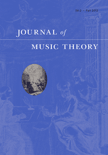
JOURNAL OF MUSIC THEORY
Scope & Guideline
Innovating Insights in Music Scholarship
Introduction
Aims and Scopes
- Analytical Approaches to Music:
The journal publishes research employing a variety of analytical techniques to examine musical compositions across genres, highlighting both traditional and contemporary methods. - Historical Contextualization of Music Theory:
Many articles explore the evolution of music theory through different historical periods, emphasizing how cultural and social factors influence musical practices and theoretical frameworks. - Cross-Genre Studies:
The journal encourages studies that bridge gaps between genres, including popular music, classical traditions, and non-Western music, fostering a comprehensive understanding of global music theory. - Interdisciplinary Perspectives:
Research often incorporates insights from related fields such as dance, performance studies, and cultural studies, reflecting the interconnectedness of music with broader artistic and social phenomena. - Pedagogical Insights:
The journal also addresses music theory education, discussing methodologies and historical practices in teaching music theory across different educational systems.
Trending and Emerging
- Popular and Vernacular Music Studies:
There is a growing emphasis on the analysis of popular and vernacular music forms, such as blues, rock, and rap, which signifies an expanding interest in how these genres can inform and challenge traditional music theory. - Interdisciplinary Approaches:
Research that blends music theory with other disciplines, such as dance, cultural studies, and performance practices, is increasingly prominent, suggesting a shift towards a more holistic understanding of music. - Contemporary Music Analysis:
The journal is seeing more studies focused on contemporary music, including the analysis of modern compositional techniques and the exploration of emergent musical forms, reflecting the current musical landscape. - Global Music Theory Perspectives:
There is a notable trend towards incorporating global perspectives in music theory, with research exploring non-Western music traditions and their theoretical implications, highlighting a more inclusive approach to music scholarship. - Technological Impact on Music Theory:
Emerging discussions about the role of technology in music composition and analysis are becoming more common, reflecting the influence of digital tools on contemporary music practices.
Declining or Waning
- Traditional Western Classical Music Theory:
There seems to be a reduction in focus on traditional Western classical music theory, with fewer papers addressing standard harmonic practices and tonal analysis that have historically dominated the field. - Narrow Focus on Specific Historical Figures:
Research centered on specific historical composers or figures, such as exclusive studies on individual composers, is less prevalent, as the journal trends towards broader thematic explorations. - Static Theoretical Models:
The application of static or rigid theoretical models is waning, with a shift towards more dynamic and adaptable frameworks that account for contemporary music practices.
Similar Journals
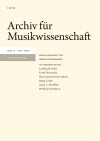
ARCHIV FUR MUSIKWISSENSCHAFT
Unveiling the Rich Tapestry of MusicologyARCHIV FUR MUSIKWISSENSCHAFT, the esteemed journal published by FRANZ STEINER VERLAG GMBH, serves as a significant platform for the dissemination of scholarly research in the field of musicology. With an ISSN of 0003-9292 and an established history of publication reaching back to 2002, this journal aims to explore various aspects of music theory, history, and ethnomusicology, contributing to academic discourse within a vibrant global community. Despite its designation in the Q4 category for music in 2023, the journal continues to foster innovative research and discussions among budding musicians, established academics, and music enthusiasts alike. While Open Access options are not currently available, the journal's offerings are enriched by a thorough review process aimed at maintaining high academic standards. Located in Stuttgart, Germany, at BIRKENWALDSTRASSE 44, D-70191, ARCHIV FUR MUSIKWISSENSCHAFT is committed to engaging its readers through insightful articles and reveals the evolving landscape of music scholarship while remaining a resourceful tool for researchers and students pursuing knowledge in this captivating field.

REVUE DE MUSICOLOGIE
Cultivating Knowledge in the Art of SoundREVUE DE MUSICOLOGIE is a prominent academic journal dedicated to the diverse field of musicology, published by EDITIONS TRANSATLANTIQUES in France. With an ISSN of 0035-1601, this journal has been a key platform for researchers and scholars since its inception, fostering scholarly discourse and advancing the understanding of music's cultural, theoretical, and historical dimensions. Although it currently holds a Q4 category in Music according to the 2023 quartiles and is ranked #140 in the Scopus Arts and Humanities Music category, REVUE DE MUSICOLOGIE continues to publish valuable insights that contribute to the global musicological landscape. The journal does not offer open access, adhering to standard subscription models. Its primary objective is to provide a rigorous forum for original research articles, reviews, and theoretical discussions, making it an essential resource for academics, professionals, and students in the field of musicology. Located at 50 RUE JOSEPH DE MAISTRE, 75018 PARIS, FRANCE, it promises to remain a vital part of music research through 2023 and beyond.

MUSIKFORSCHUNG
Advancing Understanding Through Musical DiscourseMUSIKFORSCHUNG is a distinguished journal in the field of music studies, published by NEUWERK-BUCH UND MUSIKALIENHANDLUNG in Germany. With its ISSN 0027-4801, the journal caters to scholars, practitioners, and students interested in the diverse realms of musicology. Although it is currently not an Open Access publication, MUSIKFORSCHUNG plays a vital role in the academic landscape by disseminating research and critical discourse on music from various historical and contemporary perspectives. The journal has established its worth in the academic community, being categorized in the Q4 quartile in Music for 2023 and holding a rank of #169 out of 180 in the Scopus Arts and Humanities Music category, placing it within the 6th percentile. With publication activities spanning from 2002 to 2013 and resuming in 2016 through to 2024, MUSIKFORSCHUNG continues to be a crucial resource for those dedicated to advancing music scholarship. Set in the cultural heart of Kassel, Germany, the journal invites contributions that foster an understanding of music's impact on society and culture.

Revista de Musicologia
Diving into the Rich Tapestry of MusicologyRevista de Musicologia is a distinguished academic journal dedicated to the exploration and analysis of musicology, published by the SOC ESPANOLA MUSICOLOGIA. Based in Spain, this journal serves as a vital platform for music scholars, researchers, and enthusiasts to share innovative insights and original research concerning various aspects of music, including historical studies, ethnomusicology, and contemporary critiques. With its ISSN 0210-1459 and a current Scopus ranking placing it in the Q3 quartile of Music studies, the journal reflects a commitment to enhancing the discourse in this rich field. Although it currently does not publish under an open-access model, it continuously aims to provide a rigorous peer-reviewed environment for contributions that engage both academic inquiry and practical applications within musicology. The Revista de Musicologia is thus an essential resource for anyone in the field looking to expand their understanding and expertise in music studies from 2016 through 2024 and beyond.
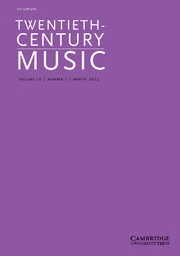
Twentieth-Century Music
Connecting Scholars to the Pulse of 20th-Century Music.Twentieth-Century Music is a premier academic journal dedicated to the study and critique of music composed in the twentieth century. Published by CAMBRIDGE UNIVERSITY PRESS, this journal holds an esteemed position in the music discipline, reflecting its significance with a Q1 ranking in the Music category as of 2023. Covering a wide timeline from its convergence years (2004 to 2010, 2012 to 2024), it serves as a vital platform for scholars, practitioners, and students to explore innovative research, critical analyses, and interdisciplinary approaches to music of this dynamic era. With an ISSN of 1478-5722 and E-ISSN 1478-5730, the journal is committed to maintaining high scholarly standards and includes open access options to enhance visibility and accessibility of research findings. As part of the robust arts and humanities community, which ranks it at 62 out of 180 in Scopus, Twentieth-Century Music is essential reading for anyone looking to deepen their understanding of contemporary musical trends and their historical contexts.

Music Theory Online
Exploring the Depths of Sound: Your Gateway to Music TheoryMusic Theory Online is a distinguished journal within the field of music, published by the Société for Music Theory. With an ISSN of 1067-3040, this open access journal has been providing valuable insights and scholarly contributions since 1993. Based in the United States, at the University of Chicago, Department of Music, it serves as a platform for rigorous research and discourse in music theory. The journal has achieved significant recognition, attaining a Q1 ranking within its category for 2023 and positioning itself at the 26th percentile among 180 journals in the Arts and Humanities, demonstrating its impact on the field. Facilitating access to cutting-edge studies, Music Theory Online aims to engage researchers, educators, and students by fostering a deeper understanding of music theory concepts and methodologies, thereby contributing to the advancement of musical scholarship.

OR SPECTRUM
Unveiling New Perspectives in Operations and Management ScienceOR SPECTRUM, published by SPRINGER, is a premier journal in the fields of Business, Management, and Operations Research, with a distinguished reputation established since its inception in 1979. As of 2023, it holds an impressive Q1 ranking in Business, Management and Accounting (miscellaneous) and a Q2 ranking in Management Science and Operations Research. The journal, which is indexed under ISSN 0171-6468 and E-ISSN 1436-6304, boasts a significant impact factor within its scope, making it a pivotal resource for cutting-edge research and theoretical developments. With access options that favor traditional subscriptions, OR SPECTRUM offers a robust platform for the dissemination of innovative ideas and methodologies, vital for academics, professionals, and students alike. The journal's commitment to excellence ensures its critical role in enhancing the understanding and application of operational research techniques around the globe.
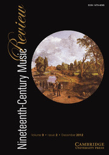
Nineteenth-Century Music Review
Advancing Scholarship in Music's Transformative EraNineteenth-Century Music Review, published by CAMBRIDGE UNIVERSITY PRESS, is an essential scholarly journal in the field of musicology, particularly focusing on the vibrant and transformative period of the nineteenth century. This journal, archived under ISSN 1479-4098 and E-ISSN 2044-8414, serves as an invaluable platform for researchers, professionals, and students alike who are dedicated to exploring the multifaceted interactions between music and society during a time of significant cultural change. With its commitment to high-quality research and critical discourse, it embraces a diverse range of topics, including historical analysis, performance practice, and socio-cultural contexts within music. Operating from the United Kingdom, Nineteenth-Century Music Review is currently categorized in the fourth quartile of music journals according to Scopus rankings, offering a unique opportunity for emerging scholars to contribute to the expanding dialogue in this niche while also reaching a broad audience within the arts and humanities. Although the journal follows a traditional subscription-based model, it continues to be a pivotal resource for academic inquiry and knowledge dissemination in the landscape of nineteenth-century music history.

Musicologica Brunensia
Unveiling Musical Insights for AllMusicologica Brunensia, an esteemed journal published by Masaryk University, Faculty of Arts, serves as a significant platform for the dissemination of knowledge in the field of musicology. Based in the Czech Republic, this Open Access journal has been facilitating scholarly communication since 2009, allowing unrestricted access to its rich array of research articles. With an ISSN of 1212-0391 and an E-ISSN of 2336-436X, Musicologica Brunensia proudly holds a Q3 ranking in the Music category as of 2023, reflecting its dedication to advancing research in the arts and humanities, particularly music. The journal accepts contributions spanning diverse topics within music studies, fostering interdisciplinary dialogue among researchers, professionals, and students alike. Located at Arne Novaka 1, Brno, 60200, Czech Republic, Musicologica Brunensia is poised to continue its journey of promoting innovative scholarship in musicology until 2024 and beyond, making it a valuable resource for anyone passionate about the field.
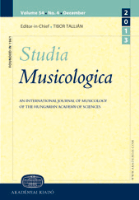
Studia Musicologica
Unveiling the Rich Tapestry of Music's HistoryStudia Musicologica, published by AKADEMIAI KIADO ZRT, stands as a leading journal in the field of musicology, dedicated to the exploration and analysis of music across diverse cultures and historical contexts. With its ISSN 1788-6244 and E-ISSN 1789-2422, this journal provides an essential platform for disseminating high-quality research and critical analyses, thereby contributing significantly to scholarly discourse in music studies. Although it operates on a traditional access model, its rigor and foundational contributions ensure that it remains invaluable for researchers, professionals, and students alike. Situated in the heart of Hungary, Studia Musicologica engages with a broad spectrum of topics including music theory, ethnomusicology, and music history, fostering a deeper understanding of music's multifaceted role in society. This makes it an essential resource for anyone interested in advancing their research or professional practice within the expansive field of musicology.